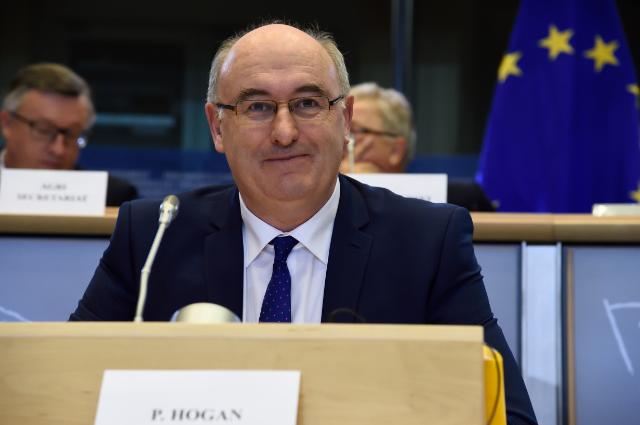Today, as part of my job (ha! hard ‘work’), I spent 2 1/2 hours watching the Agricultural Committee of the European Parliament grill the new Commissioner-Designate on Agriculture Phil Hogan and pondering his answers. After the hearing, he was approved by 32 members (vs. 10 against), making it as good as certain that he will be taking up his post come November. This makes the question all the more timely… What does he stand for? And where will the AGRI portfolio go under his lead?
In his opening remarks, and subsequently in answering the MEP’s questions, he seemed to hit most of the right tones, though there was very little detailed policy-outlook hidden in there. Though that is probably by design – as we learned during one of our Mercator seminars, in today’s world of ever-changing circumstances, the best politicians are those that keep their voters happy while staying as vague as possible. This makes it easier to adapt plans to the next unforeseen event without seeming to go back on your word.
But back to Hogan’s words… He started off with a pledge to focus on simplifying the complex rules attached to the Common Agricultural Policy. A couple of laughs were won by the statement “Let me be very clear, the one thing simplification is not – is simple!“
Then, he focused a lot of his speech on how the Juncker priorities – jobs and growth – fit into the agriculture portfolio. The answers? Competitiveness, a review on the efficiency and effectiveness of the new Common Agricultural Policy after the first year of implementation, and reorienting exports to other and new markets (particularly after Russia’s import ban).
Sustainability and greening were mentioned in one short phrase, and even after a question by the European Parliament’s rapporteur on the Organics portfolio, Martin Häusling, Hogan just gave rather vague lip service to the greenness of the CAP, stressing that agriculture needed good soil and water quality in order to flourish. But these remarks were quickly overwhelmed by the focus of keeping prices up, exploring and advocating for new markets, and getting EU farmers even more competitive than they already are.
The political agenda for the coming years will be jobs, growth and investments. I want agriculture to play its rightful, central role in that agenda and develop as a sector that is modern, market-oriented and knowledge-based. Over the coming years, the abolition of the remaining production constraints, quotas for sugar and dairy, will put EU agriculture in a much better position to respond to market signals and global challenges. And I will pay particular attention to what this new situation means for the sector.
On the Transatlantic Trade and Investment Partnership, he made the following remarks:
This agreement will be an important priority: but it must also be reasonable and balanced: on this point the President-elect Juncker has been very clear. In particular: It will not lead to downward pressure for our own production standards, and I intend to maintain essential border protections for the most sensitive sectors.
Again, this statement is interesting in its vagueness – what are the ‘most sensitive sectors’? Will this potentially exclude the entire meat sector, already tainted by the mares of ‘chlorine-chicken’ and hormone-addled beef entering European markets? Where will the debate go on GMO-based products and the like?

As it stands, greener production criteria – which often lead to more effort and higher prices – are frequently in contradiction to the call for efficiency and keeping a competitive edge. If the business aspect of agriculture is again front and center for the next 5 years, I foresee sustainability advocates having a hard time getting their voices heard in Brussels. Even from the questions posed by the members of the Agricultural Committee, you can see the main priorities at least in the Parliament: a majority of them are or represent farmers, conventional or otherwise, that are (understandably) mainly concerned with their bottom line in order to survive economically. Opening up new trade agreements and liberalizing the market further is likely to increase pressure on them to function as efficiently and economically as possible even further, particularly when you compare them to producers in the USA or Canada for instance. Oftentimes, environmental protection measures are the thing that just can’t be considered this year – but maybe the next. Except that this next year never really comes, especially not if there aren’t enough incentives to calculate such changes into your bottom line (as, ahem, an EU-level agricultural policy could).
Now, the Commissioner typically doesn’t have the power to completely change the course of a directorate-general, especially not in his first couple of months, but he or she does set the tone of where policy will be going (especially as such speeches are certainly cross-checked and approved with at least the other members of the Commission). And that means for AGRI – jobs and growth, growth and jobs. Now, that doesn’t have to come at the expense of sustainability, especially if the money spent on infrastructure and innovation goes into the right direction – but how big that if is, remains to be seen.

0 thoughts on “A New Boss In Town… What Will It Mean For EU Ag?”